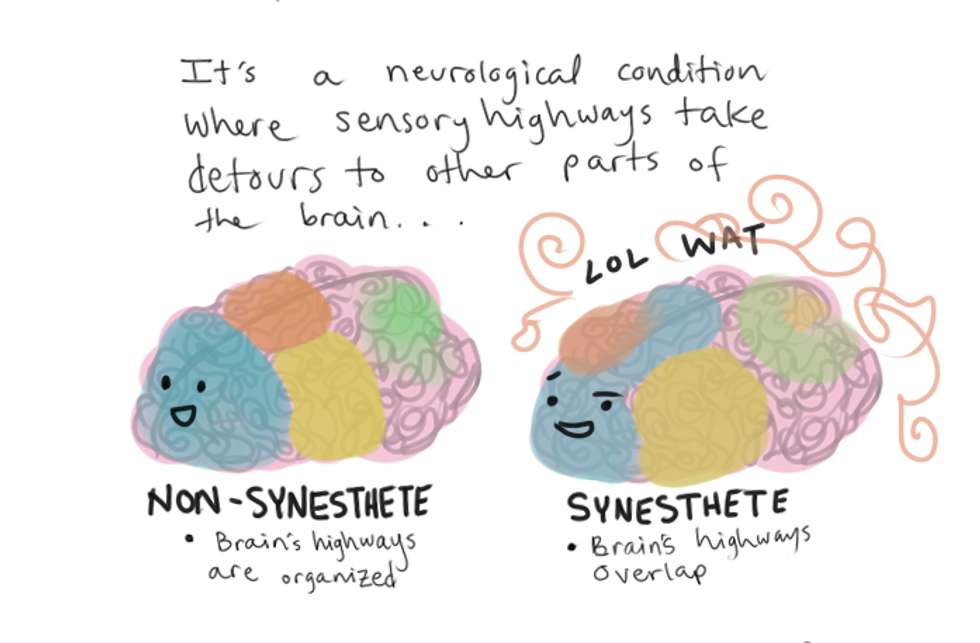I have a neurological condition. It has not been heavily studied by science, thus, there is no cure. I will almost certainly be affected by it for the rest of my life with no hope of treatment. In fact, you might have it and not even realize it yet. But, I consider this condition a positive thing. It is called synesthesia.
Synesthesia is a condition in which a person associates stimuli like numbers, letters, or sounds as having color, shape, spatial orientation, and so on. This doesn't mean that I see the number six as being yellow or green, but when I picture "6" in my mind, the number is almost always those two colors. Likewise, my father, who is a musician, "feels" that certain notes on the keyboard are certain colors, as well. Of course, there are many different types of synesthesia; too many types to list, even. However, what I described myself as having is called "grapheme-color synesthesia." Every number, and every letter, has a color that is automatically associated with it, in my mind. Here is a basic list of numbers and their associated colors. I use the numerals here, because spelling out the numbers as words gives a few of them different colors.
Recommended for you
- Red
- Blue
- Green/yellow
- Blue
- Red
- Green/yellow
- Orange
- Purple
- Red
- Red, blue
- Red, red
The numbers have been colored like this for as long as I can remember. In addition, you can notice a few patterns. Odd numbers are usually more red, while even numbers are usually more blue. Multiples of three, except nine, are both green and yellow at the same time in a way I have never been able to describe. Furthermore, for numbers greater than ten, each numeral usually has its own color (exceptions do exist, though). Words and letters are like this, as well. The letter "T" is orange, and "S" would be green. When combined into a complete word, though, the color is not dependent on any one letter. Usually, the color of the word has little to do with any of the letters in it. In fact, "Usually" is orange, even though none of the letters in it are.

As far as cause goes, no one is sure. There are theories that synesthesia is acquired at a young age when children are getting used to abstract concepts, like numbers and colors. Since it is a neurological condition, it might even be genetic. At least, in my case, this would make some sense, as one of my parents possesses it. Synesthesia isn't a popular research item in the scientific community. In fact, scientists are just now starting to run experiments on what causes it. We might find out a little information soon, but for right now, we really don't know much.
So what does this mean? Well, not too much, really. For a long while, the psychological community just called this condition an oddity, and never focused research on it. However, we are now finding that people with synesthesia may have slightly higher mental skills. For instance, people with grapheme-color synesthesia might be better in math, or memorizing long strings of numbers. People who associate sounds with colors tend to have much better pitch. For the most part, I find this to be true. I'm not going to say I'm great at math, but I am able to memorize extremely long strings of numbers with hardly any effort because of how the numbers "feel." Both my dad and another friend of mine are musicians and possess synethesia dealing with color and sound. This might be a rare case where having a neurological condition is actually helpful. Personally, I think having the added sense is fascinating, and I would never give it up.
Before a few years ago, I never even considered any of this abnormal. I thought everyone saw numbers with colors. It wasn't until a friend pointed out that it wasn't too common that I began to realize that I had it. A lot of cases of synesthesia are like this, in fact. We never consider it "strange" because it's just so natural to us.
1, 7, 3, 6, 4, 8.








 man running in forestPhoto by
man running in forestPhoto by 





 "I thought you knew what you signed up for."
"I thought you knew what you signed up for." man and woman in bathtub
Photo by
man and woman in bathtub
Photo by  four women sitting on black steel bench during daytime
Photo by
four women sitting on black steel bench during daytime
Photo by  Uber app ready to ride on a smartphone.
Photo by
Uber app ready to ride on a smartphone.
Photo by  woman in red tank top and blue denim shorts standing beside woman in black tank top
Photo by
woman in red tank top and blue denim shorts standing beside woman in black tank top
Photo by  blue marker on white printer paper
Photo by
blue marker on white printer paper
Photo by  welcome signage on focus photography
Photo by
welcome signage on focus photography
Photo by  woman in white and black striped long sleeve shirt lying on bed
Photo by
woman in white and black striped long sleeve shirt lying on bed
Photo by  pink pig coin bank on brown wooden table
Photo by
pink pig coin bank on brown wooden table
Photo by  person holding iPhone 6 turned on
Photo by
person holding iPhone 6 turned on
Photo by  person holding pencil near laptop computer
Photo by
person holding pencil near laptop computer
Photo by  person slicing vegetable
Photo by
person slicing vegetable
Photo by 
 woman covering mouth with sweater
Photo by
woman covering mouth with sweater
Photo by  person holding remote pointing at TV
Photo by
person holding remote pointing at TV
Photo by  a woman with her arms raised in a crowd of people
Photo by
a woman with her arms raised in a crowd of people
Photo by  "Shocked disbelief: '95% of the population is undateable?'"
"Shocked disbelief: '95% of the population is undateable?'"








